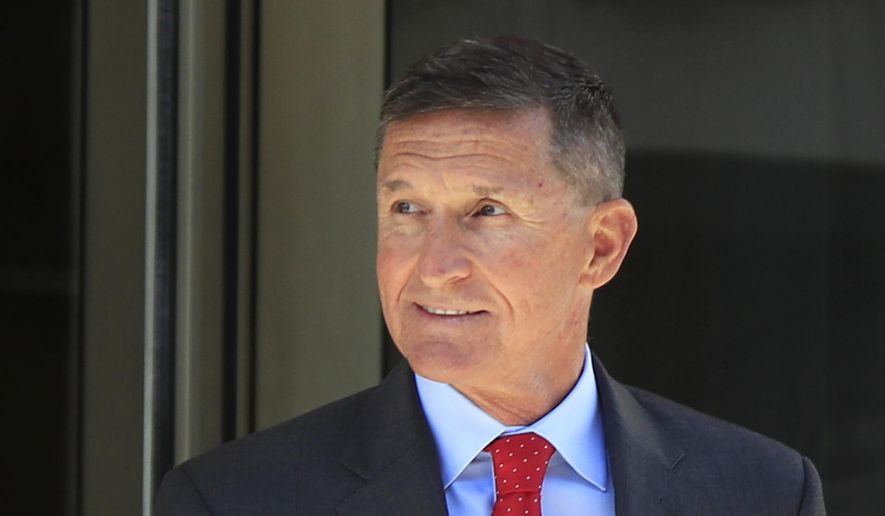Justice Department lawyers have pressed a federal court to sign off on its decision to drop the politically charged case against Michael Flynn, President Trump’s first national security adviser, saying the proceedings had become a “public spectacle.”
“This has already become a public spectacle and, I think, becoming more of a public spectacle,” Jeffrey B. Wall, principal deputy attorney general for the department, told the court. “It threatens to harm not just the integrity of the Executive [Branch] and its prosecutorial discretion and its deliberative processes but I think it threatens to harm the Judiciary [Branch] as well.”
The arguments Friday before a three-judge panel of the U.S. Court of Appeals for the D.C. Circuit, which will decide whether to drop criminal charges against Flynn for lying to FBI agents, will test Justice Department power to abandon prosecutions it thinks are too political.
Flynn had initially told a federal court twice he was guilty but later recanted, professing his innocence.
Attorney General William Barr last month directed the Justice Department to drop the charges. He said newly surfaced evidence showed the FBI had no basis to interview Flynn at all because it planned to close the case after finding no wrongdoing.
U.S. District Judge Emmet Sullivan has challenged the Justice Department’s decision to drop it. He appointed a retired federal judge to argue in favor of continuing the case and review whether Flynn should be held in contempt.
Mr. Barr’s actions have shifted the case from broader questions about guilt and innocence to allegations of political interference and when it is appropriate for an attorney general to intervene.
“It’s an intrusive process,” Mr. Wall said adding that the case is “playing out in a politicized environment.”
He warned the court that real harm could occur if the government is forced to answer questions about Mr. Barr’s policy judgment and why prosecutors in the case refused to sign off on the motion to dismiss.
“Courts were not supposed to go down this road,” he said.
Beth Wilkinson, a top D.C. lawyer arguing on behalf of Judge Sullivan, told the panel that the Justice Department jumped the gun going to the appeals court. She said attorneys should have gone straight to Judge Sullivan if they had any concerns about dismissing the case.
“The government’s motion is still pending and it may very well be granted,” she said.
In a filing earlier in the week, John Gleeson, the former federal judge tapped by Judge Sullivan to review the case, skewered Mr. Barr, saying his handling of the case is “irregular” and the courts would “scoff” at dropping the case if it didn’t involve a Trump associate.
Mr. Wall said the Gleeson filing flat-out alleges misconduct against the attorney general and has turned the case into a political spectacle.
One of the judges on the panel, Neomi Rao, asked Ms. Wilkinson who Judge Gleeson was representing. She said he represents the court’s authority to argue against the government’s motion.
At the hearing, Flynn attorney Sidney Powell asked the appellate court to end the case. She argued Judge Sullivan didn’t have the authority to appoint a judge to review the case or keep it alive after the Justice Department sought to end it.
“The judge has no authority to do anything further in this case,” she said. “The parties have decided, the government has quit, and he also has no authority to go into the reasons behind the executive’s determination to dismiss the case.”
The appellate court judges challenged her asking why the judge had to dismiss the case, expressing concern about constraining his authority. Judge Sullivan has said he hasn’t decided whether to dismiss the case and scheduled a hearing on the matter next month.
“The courts have said he’s not merely a rubber stamp either, so there’s nothing wrong with him holding a hearing,” said Judge Karen Henderson. “I don’t know of any authority that says he can’t hold a hearing before taking action.”
• Jeff Mordock can be reached at jmordock@washingtontimes.com.




Please read our comment policy before commenting.